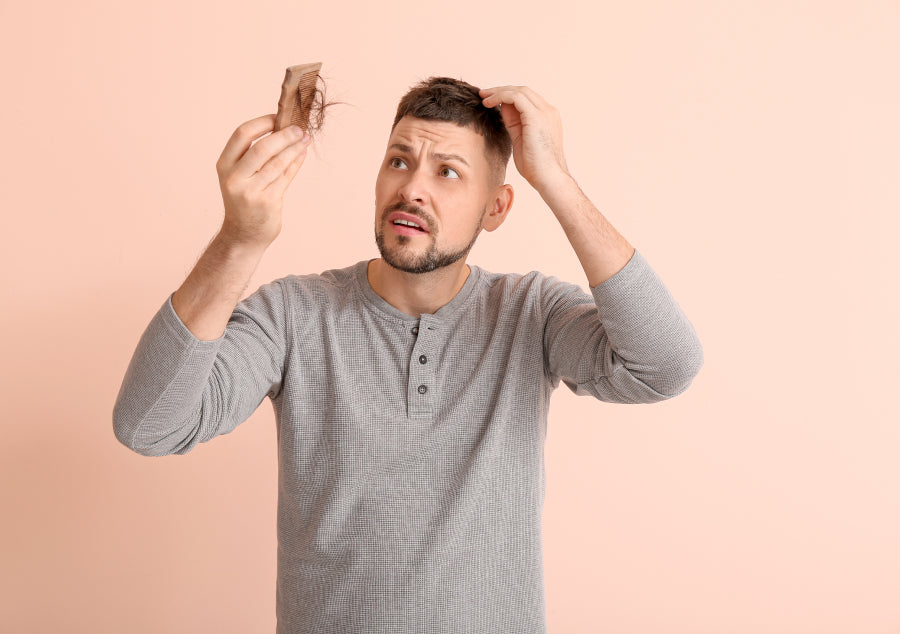Yes, you read that right. While hair shedding from time to time is normal, a continuous bout might have its roots in our mental well-being.
Curious about the tie between anxiety and hair loss? Let's unravel this together.
The Science Behind Anxiety and Hair Loss

At its core, anxiety is the body's natural response to stress. However, chronic anxiety can lead to a slew of physical symptoms, and one of them is hair loss. But how does this happen?
Telogen Effluvium: Stress and anxiety can push hair follicles into a "resting" phase, where they don't produce new hair strands. After some months, hair in this phase might fall out suddenly while washing or combing.
Alopecia Areata: This is an autoimmune condition where the immune system attacks hair follicles. Chronic stress and anxiety are believed to be potential triggers.
Trichotillomania: An impulse control disorder, this condition prompts individuals to pull out their own hair when they're stressed or anxious.
Identifying Anxiety-Induced Hair Loss
Here are signs that anxiety might be impacting your hair's health:
- Excessive hair loss from the scalp or other body parts.
- Bald patches appearing suddenly.
- Thinning hair.
- The urge to pull out hair from the scalp or eyebrows.
Treating Hair Loss Due to Anxiety

Addressing the Root Cause: Therapy or counseling can be beneficial in managing and reducing anxiety levels, which can in turn reduce hair loss.
Medication: Some over-the-counter and prescription treatments can help regrow hair or prevent further hair loss.
Proper Hair Care: Gentle hair care routines, avoiding harsh chemicals, and regular scalp massages can promote hair health.
Relaxation Techniques: Meditation, deep breathing exercises, and yoga can help alleviate anxiety and its symptoms.
Preventing Anxiety and Hair Loss
In a world rife with uncertainties and challenges, it might seem like a tall order to prevent anxiety and its physical manifestations like hair loss. But with the right strategies in place, it's entirely possible to fortify both your mind and your mane. Let's discuss some preventive measures:
Establishing a Routine:
Establishing a routine can provide a sense of normality. From waking up at the same time to maintaining a structured day, routines can be a grounding force amidst chaos.
Healthy Diet and Hydration:
What we eat affects our mental and physical health. Ensure you're consuming a balanced diet rich in vitamins and minerals, especially those known to promote hair health, such as vitamin E, biotin, and omega-3 fatty acids. Hydrating adequately also plays a pivotal role in keeping hair nourished and healthy.
Regular Exercise:
Exercise is a natural stress-reliever. Whether it's a brisk walk, a yoga session, or a high-intensity workout, physical activity can help release built-up tension and stress, thereby reducing anxiety levels.
Limiting Stimulants and Alcohol:
Stimulants like caffeine can exacerbate anxiety symptoms in some individuals. While an occasional drink might seem like it's helping you relax, alcohol can, in fact, increase feelings of anxiety as its effects wear off.
Mindfulness and Meditation:
Engaging in mindfulness exercises and meditation can help you remain present, diminishing the impact of stressors. These practices have been shown to reduce anxiety levels and could indirectly help in preventing hair loss linked to stress.
Seeking Support:
Remember, it's okay to seek help. If you feel overwhelmed, talking to a therapist or counselor can provide the tools and strategies you need to cope better. They can offer a safe space to express your concerns and feelings, and guide you through managing and reducing anxiety.
Avoiding Harsh Hair Treatments:
Even as you tackle anxiety, it's crucial to pamper your hair. Avoid tight hairstyles, minimize heat styling, and steer clear of harsh chemicals. These can exacerbate hair loss, especially when your hair might already be vulnerable due to stress.
Can Hair Grow Back After Anxiety-induced Hair Loss?
The good news? In many cases, hair loss caused by anxiety is reversible. Once the underlying anxiety is addressed and reduced, and with proper hair care, it's likely for the hair to regrow. However, the time frame varies from person to person.
Conclusion
Anxiety doesn't just manifest in the mind; it can show its signs physically, with our hair being a significant indicator. If you suspect that anxiety is the culprit behind your hair woes, seeking professional guidance is paramount. Remember, both your mind and your mane deserve care and love.




Leave a comment
This site is protected by hCaptcha and the hCaptcha Privacy Policy and Terms of Service apply.